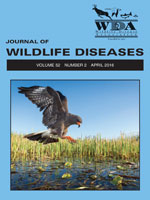Several highly infectious diseases can be transmitted through feces and cause elevated mortality among carnivore species. One such infectious agent, canine distemper virus (CDV; Paramyxoviridae: Morbillivirus), has been reported to affect wild carnivores, among them several felid species. We screened free-ranging and captive wild carnivores in Costa Rica for CDV. Between 2006 and 2012, we collected 306 fecal samples from 70 jaguars (Panther onca), 71 ocelots (Leopardus pardalis), five jaguarundis (Puma yaguaroundi), 105 pumas (Puma concolor), five margays (Leopardus wiedii), 23 coyotes (Canis latrans), and 27 undetermined Leopardus spp. We found CDV in six individuals: one captive jaguarundi (rescued in 2009), three free-ranging ocelots (samples collected in 2012), and two free-ranging pumas (samples collected in 2007). Phylogenetic analyses were performed using sequences of the phosphoprotein (P) gene. We provide evidence of CDV in wild carnivores in Costa Rica and sequence data from a Costa Rican CDV isolate, adding to the very few sequence data available for CDV isolates from wild Central American carnivores.
How to translate text using browser tools
1 April 2016
Canine Distemper Virus in Wild Felids of Costa Rica
Roberto Avendaño,
Flor Barrueta,
Sofía Soto-Fournier,
Max Chavarría,
Otto Monge,
Gustavo A. Gutiérrez-Espeleta,
Andrea Chaves
ACCESS THE FULL ARTICLE

Journal of Wildlife Diseases
Vol. 52 • No. 2
April 2016
Vol. 52 • No. 2
April 2016
canine distemper virus
Costa Rica
phosphoprotein gene
sequence analysis
wild felids




